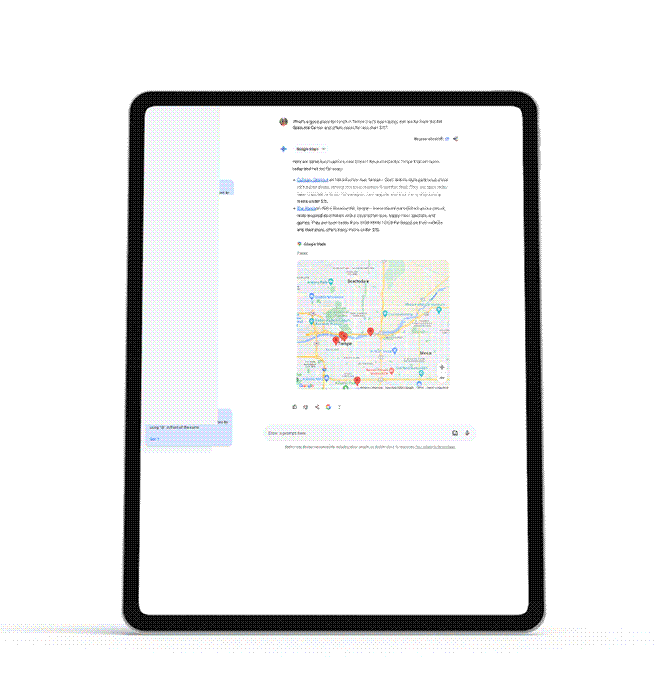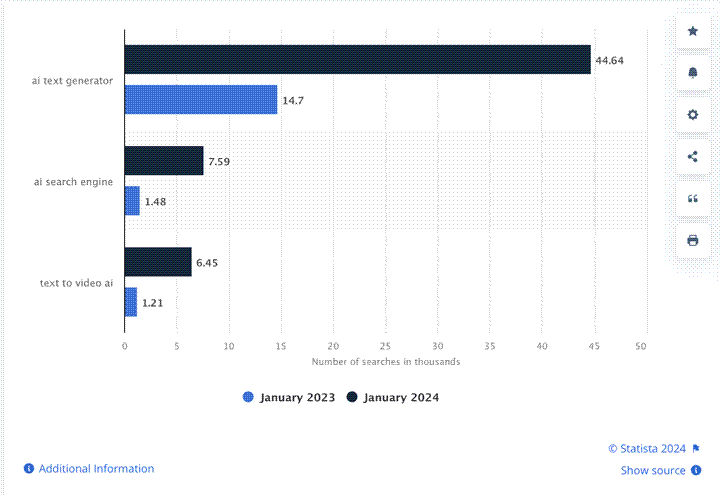The Rise of AI Search: A Paradigm Shift in SEO Optimized Web Content
The landscape of search engine optimization (SEO) is on the cusp of a significant transformation. The rise of AI-powered search engines potentially promises a future where understanding user intent and crafting truly valuable content takes center stage. While traditional SEO tactics will still hold value, the way we approach optimization will need to adapt to this evolving environment. Let’s take a look at how AI is likely to reshape SEO optimized web content strategies in the near and long term.
What is AI powered search?
Why is it important to refine SEO optimized web content to take advantage of AI search engines and chatbots?
Before we discuss the importance of shifting our content creation philosophy to serve better results for AI generated searches, first we should talk about the rise of AI powered search and where a web visitor might encounter it. There are a number of AI models, including ChatGPT, Google Gemini, BingAI, and Yep. Each of these models is “trained” on a different dataset, although many models appear to incorporate similar data in their output.
The goal of AI powered search is to better understand the user’s intent when asking for information; in principle, the responses should be more relevant to what a person is actually looking for, regardless of how they may choose to phrase the question. Each new iteration of these search engine hybrids should result in users finding pertinent information in fewer steps, or with more accuracy based on less information. Keep in mind that the key word here is “should”, not will.
There is no guarantee that we’ll see better search results, instead we may simply see pages that are created with less information and more AI generated babble stuffed into them, especially if those types of pages seem to be rewarded in the resulting responses. If this is the case, then SEO optimized web content will look more like it did in 1999, as opposed to what it should look like in 2024.
Here’s an example of a Google Gemini search on an iPad and the results for the natural language query “What’s a good place for lunch in Tempe that’s open today, not too far from the Art Resource Center and offers mains for less than $15?”
In this instance, Google Gemini incorporates Maps and basic Google search results, as well as giving me the option to share my results, export them to Google Docs, or to generate a draft in Gmail with the response.

These AI powered searches can be fun – we can “talk” to an AI search bot as if it were a human almost!
Near-Term Impact: Refining Our Approach
In the immediate future, AI will refine how we approach SEO in several key areas:
- Keyword Research with Nuance: AI tools can analyze vast amounts of search data to identify not just relevant keywords but also user intent behind those searches. This allows for a more targeted approach, focusing on creating content that addresses users’ specific needs and search queries. AI can also identify long-tail keywords and emerging trends, helping websites stay ahead of the curve.
- Enhanced Content Optimization: AI can analyze top-performing content and identify patterns in elements like structure, tone, and length. This data can then be used to optimize new content for better search engine ranking and user engagement. Additionally, AI writing assistants can generate drafts or outlines, saving time and resources for human content creators.
- Personalization at Scale: AI-powered search engines can personalize results based on individual user data. This means that focusing solely on keyword rankings might not be enough. Websites will need to create content that resonates with a variety of user personas and search intentions. Optimizing for voice search, which is becoming increasingly popular, will also be crucial.
- Focus on Expertise and Authority: AI algorithms are becoming adept at identifying trustworthy sources and content with high expertise. Websites will need to demonstrate their authority in their niche through well-researched content, backlinks from reputable sites, and engagement metrics like user reviews and social media shares.
As we can already see, the number of search interactions using AI to provide results is already starting climb, especially given that ChatGPT was not made available to the public until late in 2023, and other search engines followed suit in the weeks and months after its introduction.

Source: https://www.statista.com/statistics/1384280/online-searches-ai-artificial-intelligence-united-states/
Long-Term Vision: A Semantic Shift
In the long term, AI is likely to usher in a more semantic approach to search engine optimization. Here’s what we might expect:
- Understanding Context over Keywords: The emphasis may shift from keyword stuffing to creating content that truly understands and addresses the underlying context of a user’s search query. AI will play a key role in helping search engines grasp the deeper meaning and intent behind keywords.
- Focus on Entity Recognition: AI will allow search engines to identify and understand the relationships between different entities mentioned in web content. This will enable them to connect users with the most relevant information, even if those keywords aren’t explicitly mentioned on the page.
- Evolving Search Queries: As voice search and conversational search interfaces become more prevalent, the way users search for information will evolve. SEO strategies will need to adapt to this shift, focusing on natural language understanding and creating content that answers users’ questions in a clear and concise way.
- The Rise of Knowledge Graphs: AI will power the development of knowledge graphs, which are massive databases that link together concepts and entities. This will allow search engines to deliver richer and more comprehensive results that connect users with a broader understanding of a topic. Websites that align their content with these evolving knowledge graphs will likely benefit from increased visibility.
The Human Touch Remains Essential
It’s important to remember that AI is not a replacement for human expertise in SEO. While AI can automate many tasks and provide valuable insights, human creativity, judgment, and understanding of the user experience will remain critical. The human element will continue to play a vital role in shaping SEO optimized web content since humans are the intended recipients of the responses when we are looking for a great restaurant, trying to decide where to catch a movie, or doing research for school or work.
For example, content strategy and ideation – AI can assist with content generation, but humans are still needed to develop overall content strategy, brainstorm compelling topics, and ensure the content resonates with the target audience.
Another great example is editorial oversight and quality control – AI-generated content might require editing and human oversight to ensure it’s accurate, well-written, and engaging for readers. The current AI models have a tendency to “hallucinate”, which is simply another term for returning incorrect information. An easy way to understand these hallucinations is to ask an AI powered search bot about yourself; you may be surprised to learn that you have written multiple books, are an accomplished TED talk speaker, or have won numerous awards in categories that you may not be familiar with at all.
Last but certainly not least is user experience optimization – understanding user behavior through analytics and A/B testing is crucial for long-term SEO success. Humans are better positioned to analyze data and make strategic decisions about website design and user experience. Just because a computer “thinks” that a response makes sense does not always mean that it makes sense to a human reading the response. Clearly we can find content scattered all over the web (hey there Facebook!) that serves no purpose other than to take up space and burn through bandwidth, rather than providing useful information of any sort.
Start to develop a long term strategy for your SEO optimized web content today
The rise of AI-powered search presents both challenges and opportunities for SEO professionals, and offers a newly leveled playing field for maximizing the return on your investment in SEO optimized web content. By embracing AI tools and adapting strategies to a more semantic and user-centric approach, businesses can stay ahead of the curve and ensure their content is discoverable in the ever-evolving search landscape.
In a particularly fair world, the shift away from keyword stuffing to creating truly helpful, information SEO optimized web content should help to level the playing field for smaller sites with fewer pages but better content on those pages; the reality may be something entirely different. While it’s too soon to know for certain, it’s never too soon to start an audit of your site and your assets to ascertain what can be tweaked for better optimization and potentially more favorable positioning when a human is searching for something you have.
Talk to me today about an SEO audit and a plan to upgrade your current SEO optimized web content that will retain it’s current rankings while positioning you to take advantage of the next generation in search. While AI can automate tasks and provide valuable insights, human expertise and creativity will remain essential for long-term success.
The future of SEO lies in a collaborative approach where AI empowers humans to create content that is both informative and search-engine friendly.
Let's talk.